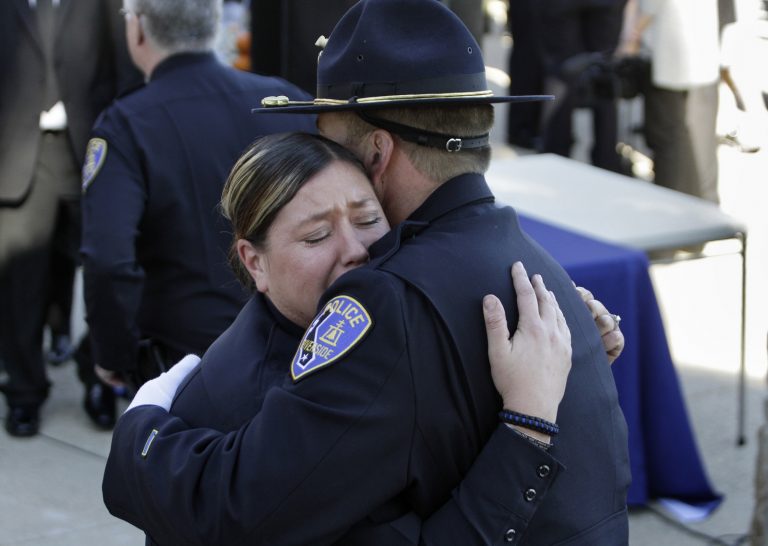
Image by Jonathan Alcorn/Getty Images.
“A Man Is Nothing Without His Name”: Religious Themes in the Christopher Dorner Manifesto
In the wake of former LAPD officer Christopher Dorner’s recent crimes, media attention to his manifesto, “Last Resort,” has focused on Mr. Dorner’s description of racism within that police department and on the disturbing madness of his comments. While “racism” and “rambling” are words often tagged to his manifesto, religion, too, is present here, offering an essential vocabulary for Mr. Dorner’s justifications of his crimes.
“I lived a good life and though not a religious man I always stuck to my own personal code of ethics, ethos and always stuck to my shoreline and true North,” he writes. While “No one grows up and wants to be a cop killer,” Mr. Dorner insists that his experiences as a police officer viscerally and intuitively “disgusted” him. “I saw some of the most vile things humans can inflict on others” he says of his fellow LAPD officers, people whom he calls “dirtbags” for their gallows humor at crime scenes, or for equating overtime pay with their presence at such scenes. Mr. Dorner argues that no one needs an articulated system of ethics to know that such actions are wrong. Yet Mr. Dorner also mentions Christianity, even while denying association with the religion himself. “I’m not a … Christian,” he writes, though even “that old book, made of fiction and limited non-fiction, called the Bible,” can be held up as a model of ethics. At the very least, it cannot be used, Mr. Dorner argues, to justify racist behavior.
Mr. Dorner’s stance on Christianity (rejection of the institutional church, its theology and history, coupled with respect for a basic ethical teaching advanced by Jesus) parallels stances in two popular African American religious movements, the Moorish Science Temple and the Nation of Islam. As a city cop, Mr. Dorner would surely have been exposed to these religions. A reference in his manifesto to the pun between “Justice” and “Just us” (also popular in Moorish Science and Nation of Islam circles where the pun has specific religious meanings, notably as a secret teaching regarding Jesus and the nature of salvation) stands as evidence of such religious influence. Like Mr. Dorner, Moors reject the hypocrisy of Christianity but hold that Jesus was himself a dark-skinned Moor and that his gospel was offered as a redeeming ethical message for the pale-faced “European” nations. Along similar lines, Nation of Islam leader Elijah Muhammad portrayed Jesus as an Islamic ethical thinker when he composed his own gospel.

Photo of Moorish Science Temple by TheeErin / Flickr, cc by-nd 2.0
Mr. Dorner also shares, with these two religions, a strong sense of the importance of one’s name. The Nation of Islam rejects “slave names” while, for Moors, “the name means everything” and declaring one’s correct name leads to benefits both political and metaphysical. “Name” is a central concept in Mr. Dorner’s manifesto. To justify his rampage, he claims that he was driven by an ethical desire to “clear” his “name.” “A man is nothing without his name,” he declares, highlighting the connection between his desire to redeem his reputation and his history of enduring “racial derogatory terms spoken to me.” When, as a child, he first experiences racism, his “response was swift;” he immediately punched and kicked a fellow student in the elementary schoolyard. This was the first in a long string of attempts “at obtaining my name back,” leading to military service and appeals via internal review boards and the courts.
Yet Mr. Dorner doesn’t use “name” only as a synonym for reputation; his rhetoric of naming is also a rhetoric of blood. Mr. Dorner wants a “name” untainted by racism and in keeping with what he insists is his blood inheritance of upstanding, ethical knowledge, and behavior. This notion has religious resonance as well. The sense that ancestry equals destiny and names affect one’s recognition of that ancestry and destiny is also central to Moorish Science and nation of Islam.
The rationalizations passing off fury as “righteous” and the conceptualizations and categorizations that demarcate a worldview: these are the basic data of the study of religion. In the Mr. Dorner case we see a man advancing arguments for an inherited ethical sense “in my DNA,” insisting on the value and importance of “name” in the face of a racist society, and arguing that his murderous acts should be remembered as a morally-justified attempt to restore balance to a corrupt police department. These claims, however horrifying their results, deserve careful consideration and contextualization. Christopher Dorner did not come to his worldview in a vacuum. He borrowed from, and relied upon, themes and concepts from religion in order to explain his motivations.
This essay is reprinted with permission of Sightings from the Martin Marty Center at the University of Chicago Divinity School.

Share your reflection